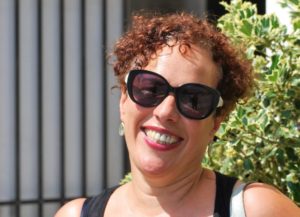 by Edana Minghella in Liguria, Italy.
by Edana Minghella in Liguria, Italy.
Sunlight through a few clouds, a hint of a breeze, warm enough to be out with just a thin jumper over a vest. I skipped downhill towards the town and the seafront, marvelling at the vibrant orangey-pink of a neighbour’s climbing dog rose and the deep purple of a mass of wisteria, pausing to peep through the gate of another’s tiny, perfect garden overlooking the sea, jaunting through the olive grove to the cackle of a pair of jays, and finally stopping to take a photo at the “sweet spot”: the point where the terracotta path curves, revealing the deep blue of the sea ahead, the promontory of Porto Venere and the islands of Palmaria and Tino, all framed by the fronds of the tall palm tree in the garden of the grand villa on the corner. I’m out. I’m out for a walk for the first time in almost 7 weeks.
Italy’s lockdown has been harsh. “Brutto”, as they say here, with a shake of the head and a hunch of the shoulders and a lift of the hands. For two months we have been allowed out only for three things: food shopping, medical needs or essential work. These three options are on a form we must take with us, along with proof of our identity and address, whenever we go out. We must specify the addresses we have come from and are going to, and why. The police may ask to see the form and can challenge us, send us home or fine us. We must only ever go out alone, and the use of masks and gloves has become increasingly required in shops. Solitary, outside exercise has been allowed early in the morning as long as you’re back home by 8am on weekdays or 7am at weekends. Dog walks, within 100 metres of your house, were permitted. Believe me, I have thought more than once of renting Renato, my neighbour’s lovely old pooch. Renato’s owner, Pietro, finished off my sentence for me when I started to suggest it. Apparently I am not the only one!
Lockdown has meant not going out to see family or friends, not popping out for a bike ride or a stroll in the park (parks are closed, playgrounds are closed, the seafront is closed) or to wonder at the beautiful sunsets. Actually not “popping out” at all – because every trip requires thinking about the form, and writing it out, and finding your mask and your gloves, and making sure you have your ID, and then turning back because you have forgotten something vital. Going to the supermarket (even now) means a two hour round trip, because of having to queue for anything up to 45 minutes outside at two meters apart, while the staff only let in a tiny number of people at any one time so that we can keep our distance while shopping. Once there, you must buy at least 10 items to stop people from using a supermarket trip as an excuse to go out several times a day. The only shops that have been allowed to open are supermarkets, butchers, greengrocers, pharmacies and newsagents.
Italy is not like the UK in many ways, but the political structure is particularly different. The Governor of our province of Liguria is accountable for what happens here, can decide on how best to implement national restrictions and in turn, influence the Mayor of our town who may or may not vary his response. As this is a seaside town, the Mayor has been especially concerned about the potential risk arising from any influx of visitors, second homers, locals who are used to mingling on the seafront for the evening passeggiata. So lockdown here has been even stricter than in many other parts of the country.
Now as the Covid curve begins to flatten in Italy, we are entering a new phase. Some of the restrictions are being lifted. But they are still tough. Yes, I can now go for a walk. But I still need my form and my ID and I may be stopped by the police. Wearing a mask outside is compulsory. I must walk on the right. I am not allowed to walk along the seafront between our town and the smaller one down the coast – a favourite stroll. I can’t wander the streets of the old town because I am not a resident there. From next week, people are allowed to visit family (but not friends) as long as everyone wears a mask during the visit. However, there is no travelling at all outside the municipality which means your family had better live close by, otherwise you ain’t seeing them yet. Take-aways will be allowed. Dogs can be taken to be groomed. Very small funerals can be held. Bookshops and dry cleaners will be open. And that’s about it. That’s Phase Two.
Another feature of local accountability within the Italian system is that the daily national tally of the number of people who have died, recovered, been tested, newly infected and so on, is broken down not just by province, but also by public health district within each province. Liguria publishes all the figures daily on its official website and even tweets them. In our own health district, as nationally, the number of people who have died, have been tested as positive and who are at home or in hospital are declining, while the number of tests is increasing. Today’s figures showed there were only 8 people in intensive care in our health district, out of a population of about 250,000. Lockdown has been working and we have all contributed to that. We have kept ourselves, our neighbours, our community as safe as possible. After this set of extreme measures, it makes a difference to know. It matters.
And for now, I can go for a walk. I can amble past the police without worrying they suspect me of sneaking out for exercise and cart me off to the nearest police station. I can smile behind my mask at someone who waits as I pass by. I can smell the flowers, the blossom. I can feel the sea breeze and take photos of the boats and the sails and the sunsets. For now, I don’t have to rent Renato.

